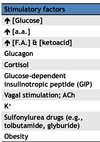Endocrine Pancreas Flashcards
What are the hormones that the islets of langerhans cells (the clusters that make up the endocrine panceas) secrete?
beta cells –> insulin
alpha cells –> glucagon
delta cells –> somatostatin

What can we use to measure endogenous B cell function?
C peptide (secreted in same amount as insulin)
What type of drugs promotes the closing of the ATP dependent K+ channel in beta pancreatic cells, causing depolarization, opening calcium channels, therefore increasing insulin secretion and treating type 2 diabetes?
Sulfonylurea drugs (ex. tolbutamide + glyburide)
What are incretin hormones and what do they do?
Incretins = GLP-1, GIP, short T1/T2
They are secreted in response to GI glucose + fat –> Stimulate insulin secretion
When insulin is secreted, which transporter transports glucose to muscle and adipose tissue?
Glut 4
When insulin is secreted, which transporter allows for the peripheral uptake of glucose via facilitated diffusion to the liver?
Glut 2
What are the actions of insulin in muscle?
increased glycogen synthesis, increased hexokinase (in liver –> CAC), increased glycolysis + carbohydrate oxidation, decreased gluconeogenesis (generating new glucose), increased protein synthesis + breakdown
Insulin –> IRS-1 –> P13 –> AKT –> ________
metabolic effects –> Glut 2 (liver) + Glut 4 (muscle)
protein, fat, + glycogen synthesis
Insulin –> IRS-1 –> GRB/SOS –> MAP Kinase –> _______
Growth
What factors stimulate insulin secretion?

What factors inhibit insulin secretion?

With no insulin what stimulates glucose uptake?
Muscle contractions –> why exercise is so important for diabetes patients + insulin resistance
What causes type 1 diabetes mellitus?
not enough insulin secretion, usually from a destruction of beta cells (autoimmune disease)
Since your body can’t secrete insulin and none of the glucose you are eating is getting absorbed, your body thinks you are fasting therefore what state do you go into?
Diabetic ketoacidosis (AKA metabolic acidosis)
Besides taking up glucose, what is an imprtant action of insulin?
Uptake of potassium into cells
Causes hypokalemia






